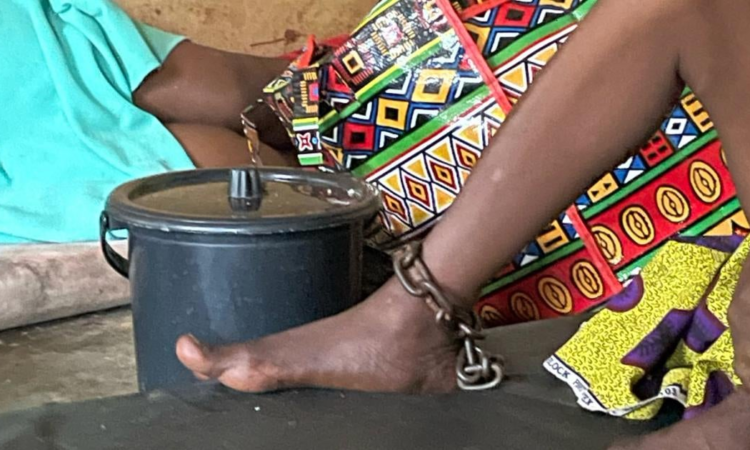
Human rights abuses are happening right now – start a monthly gift today.
They Broke Her Spirit but Should Instead Break the Chains
@Kamundia_E
Share this via Facebook Share this via Twitter Share this via WhatsApp Share this via Email Other ways to share Share this via LinkedIn Share this via Reddit Share this via Telegram Share this via Printer
When I found Arita, she was standing at the entrance of a dark and musty room at Mt. Horeb Prayer Centre, in eastern Ghana. A heavy metal chain laid on the ground beside her. She had been shackled on and off during her four years at the center, she said. At the moment she could walk freely, but the sight of the chains was a constant threat of being shackled by staff, even for small infractions such as speaking or singing too loudly.
Arita was brought to the camp by her family, who, like many people, believed demons or evil spirits caused mental health conditions and that prayer could heal them. She didn’t know if she would ever leave. She had no message or request for the government. It seemed that the prayer camp had broken her spirit.
Human Rights Watch has documented the practice of chaining people with mental health conditions in prayer camps and spiritual healing centers in Ghana for more than a decade. Although the practice was banned in 2017, and Visiting Committees and a Tribunal were recently created to enforce the ban, I still saw dozens of people in chains last week.
I thought about Arita when I went to sleep last night. I thought about her again this morning when I went to brush my teeth, a simple task that seemed almost a privilege with no chains around my ankles. Since I met Arita, I have been thinking about what it means to live without agency and dignity. No one should ever live like she has.
Ghana’s Deputy Minister for Health Tina Mensah agreed. When we met her last week, she promised to ensure that institutions that detain people with mental health conditions are monitored, saying “we are all human beings.”
This month, Ghana’s Visiting Committees and Tribunal begin monitoring these institutions. The government should operationalize Mensah’s commitment and resource these teams to ensure that they can enforce the ban on shackling. The government should also strengthen rights-respecting, community-based mental health services, so people like Arita can get help where they live.
Shackling of People with Psychosocial Disabilities Worldwide
Abuses against Persons with Mental Disabilities in Ghana
Share this via Facebook Share this via Twitter Share this via WhatsApp Share this via Email Other ways to share Share this via LinkedIn Share this via Reddit Share this via Telegram Share this via Printer
Human Rights Watch defends the rights of people in close to 100 countries worldwide, spotlighting abuses and bringing perpetrators to justice
Get updates on human rights issues from around the globe. Join our movement today.
Every weekday, get the world’s top human rights news, explored and explained by Andrew Stroehlein.
Human Rights Watch is a 501(C)(3) nonprofit registered in the US under EIN: 13-2875808







